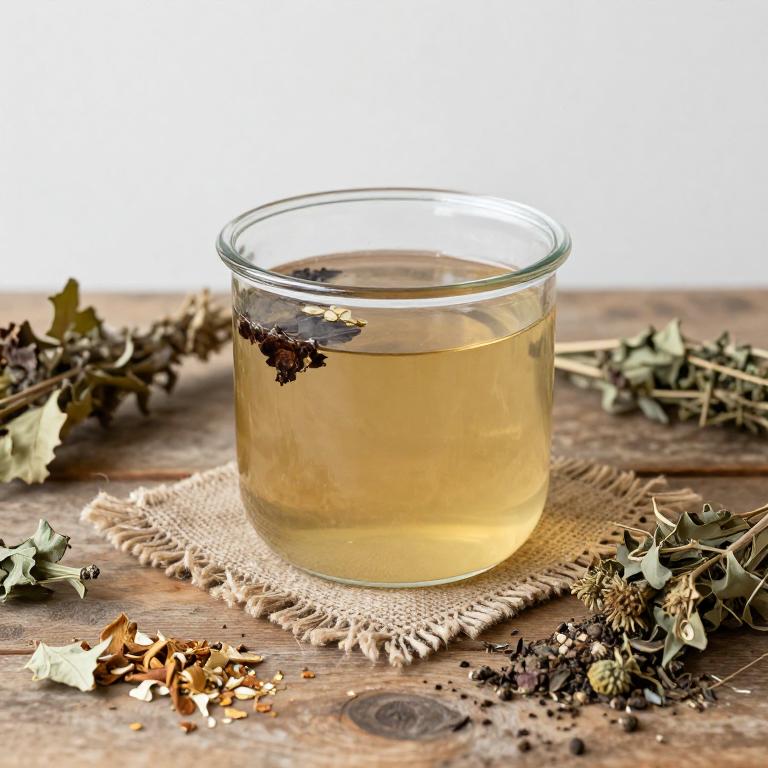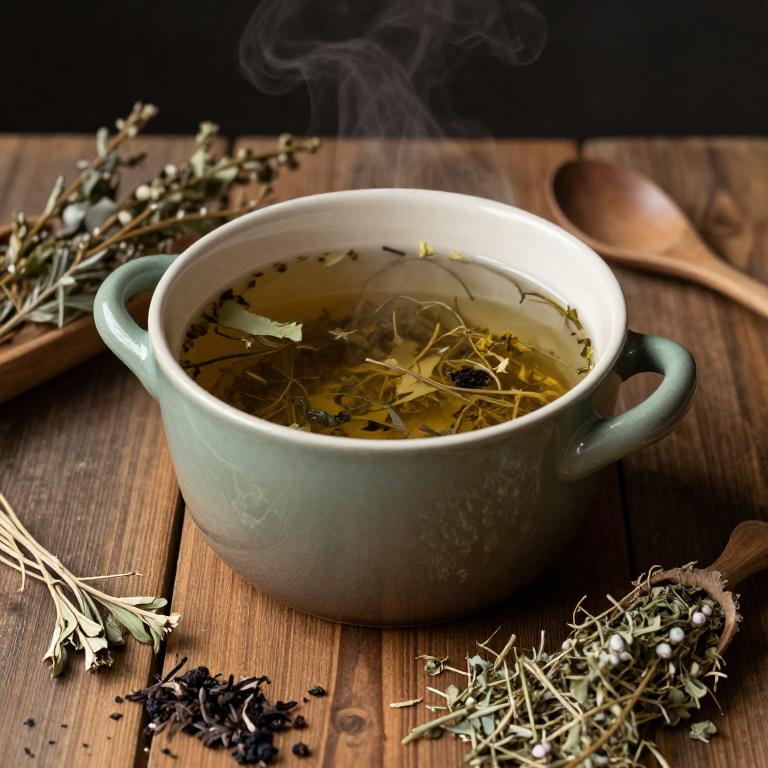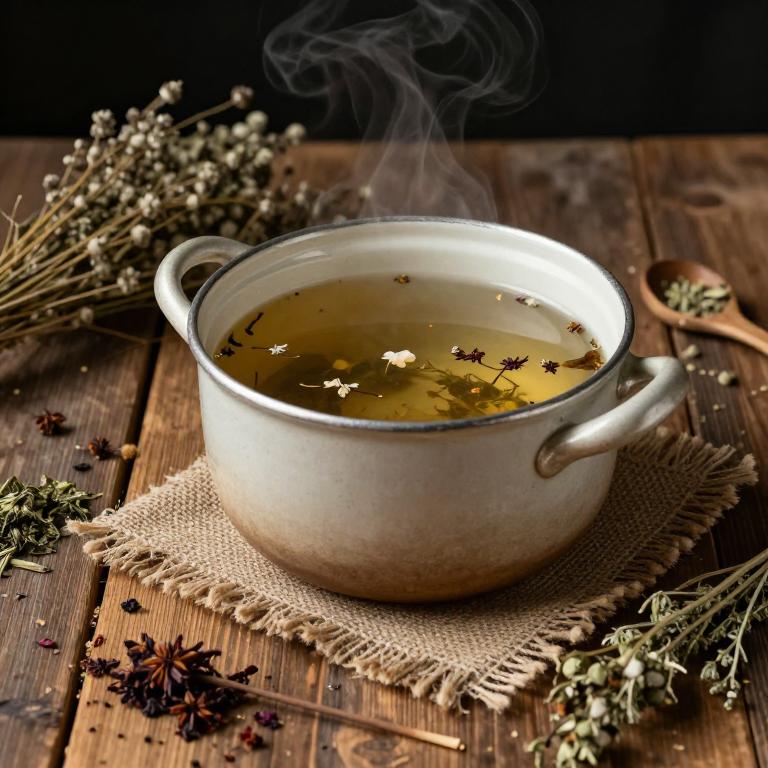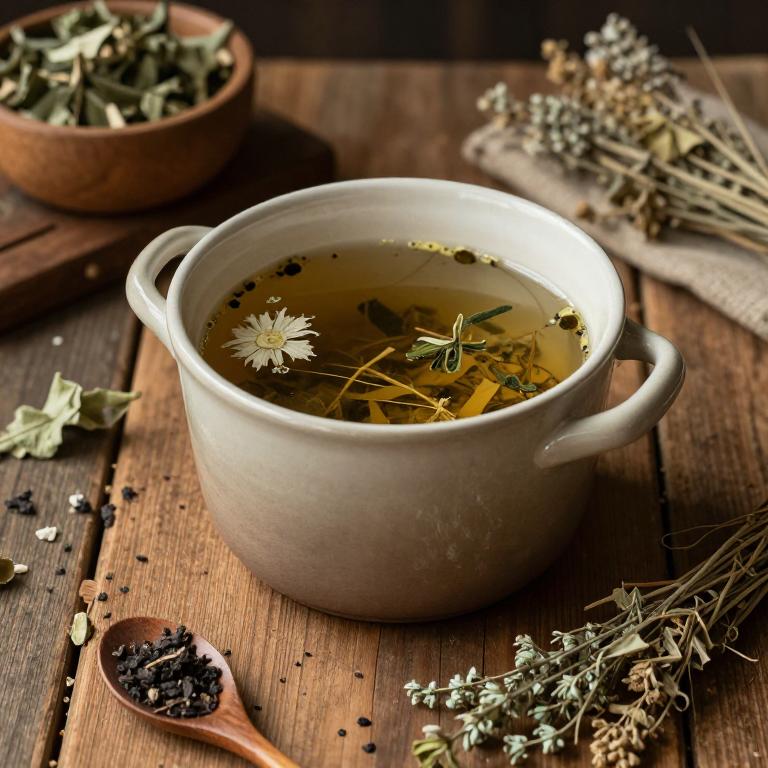10 Best Herbal Decoctions For Gas In Stomach

Herbal decoctions have been traditionally used to relieve gas and bloating in the stomach by promoting digestion and reducing fermentation.
Common herbs such as ginger, fennel, and cumin are often included in these decoctions due to their carminative and anti-inflammatory properties. To prepare a decoction, the herbs are typically simmered in water for an extended period to extract their active compounds. Drinking these herbal teas after meals can help soothe the digestive system and alleviate discomfort caused by excess gas.
While generally safe, it is advisable to consult a healthcare provider before using herbal remedies, especially for individuals with chronic digestive issues.
Table of Contents
1. Cumin (Cuminum cyminum)

Cuminum cyminum, commonly known as cumin, has been traditionally used in herbal medicine for its digestive benefits, particularly in alleviating gas and bloating in the stomach.
When prepared as a decoction, cumin seeds are simmered in water to extract their essential oils and active compounds, which possess carminative and antispasmodic properties. This herbal remedy is believed to stimulate digestion, reduce flatulence, and ease discomfort caused by excessive gas buildup. The volatile oils in cumin, such as limonene and cineole, contribute to its effectiveness in promoting gastrointestinal motility.
However, it is advisable to consult a healthcare professional before using cumin decoctions, especially for individuals with pre-existing medical conditions or those taking medications.
2. Fennel (Foeniculum vulgare)

Foeniculum vulgare, commonly known as fennel, has been traditionally used in herbal medicine for its ability to alleviate gas and bloating in the stomach.
The seeds of the fennel plant contain essential oils, such as anethol and fenchone, which have carminative properties that help relax the gastrointestinal muscles and reduce gas accumulation. To prepare a decoction, the dried fennel seeds are typically boiled in water for several minutes, then strained and consumed either warm or chilled. This herbal remedy is often used in digestive teas and is believed to ease discomfort caused by indigestion or excessive gas.
While generally safe, it is advisable to consult a healthcare professional before using fennel decoctions, especially for individuals with allergies or existing medical conditions.
3. Anise (Pimpinella anisum)

Pimpinella anisum, commonly known as anise, has been traditionally used in herbal medicine for its ability to relieve gas and bloating in the stomach.
The seeds of this plant contain essential oils, particularly anethole, which have carminative properties that help expel trapped gas from the digestive system. Anise herbal decoctions are often prepared by steeping the dried seeds in hot water for several minutes to release their active compounds. These decoctions can be consumed as a tea or taken in capsule form to ease digestive discomfort.
Due to its soothing effects, anise is a popular natural remedy for indigestion and flatulence, though it should be used in moderation to avoid potential side effects.
4. Caraway (Carum carvi)

Carum carvi, commonly known as caraway, has been traditionally used in herbal medicine for its carminative properties, which help relieve gas and bloating in the stomach.
A caraway herbal decoction is typically prepared by simmering the dried seeds in water for several minutes, allowing the active compounds to infuse into the liquid. This decoction is often consumed after meals to aid digestion and reduce gastrointestinal discomfort. The essential oils in caraway, such as limonene and alpha-pinene, are believed to relax the smooth muscles of the digestive tract, promoting the release of trapped gas.
While generally safe, it is advisable to consult a healthcare professional before using caraway decoctions, especially for individuals with existing medical conditions or those taking medications.
5. Basil (Ocimum basilicum)

Ocimum basilicum, commonly known as basil, has been traditionally used in herbal medicine for its digestive benefits, including the relief of gas in the stomach.
Basil herbal decoctions are prepared by boiling the fresh or dried leaves in water, allowing the active compounds to infuse into the liquid. These decoctions contain essential oils such as eugenol and linalool, which possess carminative properties that help reduce gas and bloating. The antispasmodic effects of basil can soothe the gastrointestinal tract, promoting easier digestion and reducing discomfort.
Regular consumption of basil decoctions may support overall digestive health and provide natural relief from gas-related symptoms.
6. Turmeric (Curcuma longa)

Curcuma longa, commonly known as turmeric, has been widely used in traditional medicine for its digestive benefits, particularly in alleviating gas and bloating in the stomach.
The active compound curcumin in turmeric possesses anti-inflammatory and antispasmodic properties that can help relax the gastrointestinal tract and reduce gas-related discomfort. When prepared as a herbal decoction, turmeric can be easily absorbed by the body and may provide a natural remedy for digestive issues. To prepare the decoction, turmeric roots are boiled in water for several minutes, then strained and consumed warm.
This traditional remedy is often combined with other herbs like ginger or fennel to enhance its effectiveness in reducing gas and improving digestion.
7. Ginger (Zingiber officinale)

Zingiber officinale, commonly known as ginger, has been widely used in traditional medicine for its digestive benefits, particularly in relieving gas and bloating in the stomach.
Herbal decoctions made from fresh or dried ginger root are prepared by simmering the rhizome in water, allowing the active compounds such as gingerol and shogaol to be extracted. These compounds possess anti-inflammatory and carminative properties that help reduce intestinal gas and ease gastrointestinal discomfort. Ginger decoctions are often recommended for individuals experiencing indigestion or post-meal bloating due to their ability to stimulate digestive enzymes and relax the muscles of the gastrointestinal tract.
However, it is advisable to consult a healthcare professional before using ginger decoctions, especially for those with existing medical conditions or who are taking medications.
8. Peppermint (Mentha piperita)

Mentha piperita, commonly known as peppermint, is often used in herbal decoctions to alleviate symptoms of gas in the stomach.
The active compounds in peppermint, such as menthol and menthone, help relax the smooth muscles of the gastrointestinal tract, reducing spasms and discomfort. When prepared as a decoction, peppermint leaves are simmered in water to extract their beneficial properties, making it easy to consume. This herbal remedy is particularly effective for individuals experiencing bloating, indigestion, or excessive gas due to its calming effect on the digestive system.
However, it is important to consult with a healthcare provider before using peppermint decoctions, especially for those with certain medical conditions or who are taking medications.
9. Black pepper (Piper nigrum)

Piper nigrum, commonly known as black pepper, is often used in herbal decoctions to alleviate symptoms of gas in the stomach.
The active compound, piperine, is believed to enhance digestive enzyme activity and promote the movement of food through the digestive tract, thereby reducing bloating and discomfort. To prepare a decoction, whole black pepper seeds are simmered in water for several minutes, allowing the beneficial compounds to be extracted. This herbal remedy is typically used in combination with other digestive herbs to maximize its effectiveness.
However, it is important to consult a healthcare provider before using black pepper decoctions, especially for individuals with stomach ulcers or gastrointestinal sensitivities.
10. Thistle (Silybum marianum)

Silybum marianum, commonly known as milk thistle, is a herbal remedy traditionally used for its potential health benefits, including its effects on gastrointestinal discomfort.
While primarily recognized for its liver-protective properties, some studies suggest that its herbal decoctions may help alleviate symptoms of gas in the stomach by promoting digestion and reducing bloating. The active compounds in milk thistle, such as silymarin, are believed to support digestive function and reduce inflammation in the gastrointestinal tract. However, it is important to note that more clinical research is needed to fully establish its efficacy for gas-related issues.
As with any herbal remedy, it is advisable to consult a healthcare professional before use, especially for individuals with existing medical conditions or those taking other medications.